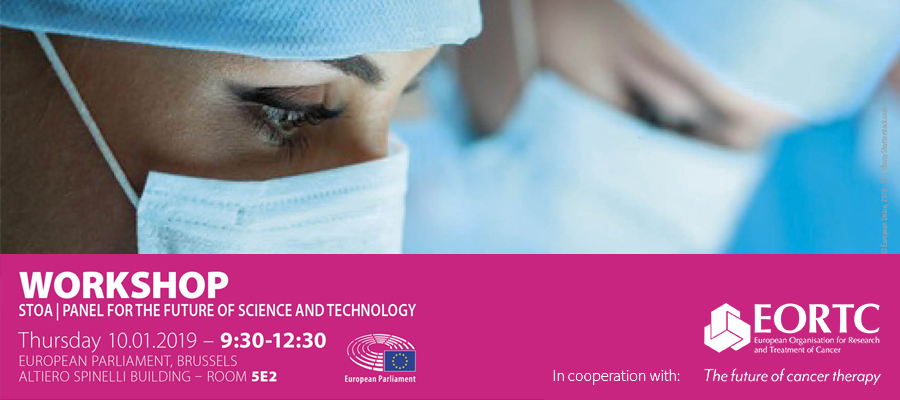EORTC – STOA Workshop INNOVATIVE SOLUTIONS FOR RESEARCH IN HEALTHCARE
24 Dec 2018
Developing novel approach to deliver better precision medicines in Europe
10th January 2019, 9h30-12h30, European Parliament, Brussels
The European Organisation for Research and Treatment of Cancer (EORTC) would like to announce a Science and Technology Options Assessment (STOA) Workshop that will be hosted in the European Parliament on 10th January 2019, 9h30-12h30 in Brussels.
The STOA panel provides Parliament’s Committees and other parliamentary bodies concerned with independent, high-quality and scientifically impartial studies and information for the assessment of the impact of possibly introducing or promoting new technologies and identifying, from the technological point of view, the options for the best courses of action to take. It organises forums in which decision-makers and representatives of scientific communities and organisations discuss and compare scientific and technological developments of political relevance to civil society.
This workshop will discuss the practical challenges of accessing new precision medicine as well as other treatment strategies. The programme will address the need to optimize patient centered clinical trial, and discuss how to improve treatment in practice for a better use of treatments for all.
Personalised medicine tailors therapy to the patient’s genetic and physical makeup. There are an increasing number of emerging “personalised” drugs targeting specific proteins, also the commercial promotion of genome-wide analyses has led to an expectation among patients that they can now receive effective personalised treatment based on the genomic signature of their disease. For such approaches to work in routine practice, the development and the proper validation of targeted therapies and complex biomarker assays is required.
In addition, there are numerous drugs authorized on the market, with limited knowledge on how to use them for dose, sequence, combination and duration of treatment. Administration of improper treatment may generate unnecessary toxicity for the patients. Inefficient use of treatment also affects national healthcare budgets without benefit for patients and adds to already highly priced treatments. Therefore, there are needs for an independent investigation on the optimal use of medicines.
The workshop will take cancer in the first instance to demonstrate how personalised medicine results in healthcare inefficiencies and what actions could be taken by the EU to alleviate these issues, ensuring that patients get the best treatment and care, improving survival and quality of life.
STOA and EORTC have invited a number of healthcare organisations, clinicians, policy makers, regulators, HTA bodies, Industry representatives and patient advocates to engage and compile recommendations to the STOA panel.
The attendance to this event is free. Registration is mandatory.
Access to the program and proceed to registration
Follow the live broadcast (10 January – 09:30)
Related News
EORTC: Advancing research and treatment for rare cancers
29 Feb 2024
EORTC Fellowship Programme: celebrating more than 20 years of impactful collaboration
22 Feb 2024
Appointment of Malte Peters as EORTC Strategic Alliance Officer
9 Feb 2024
Unique series of workshops in partnership with the European Medicines Agency (EMA)
7 Feb 2024
EORTC launches a prominent clinical trial in older patients with locally advanced (LA) HNSCC (Head and Neck Squamous Cell Carcinoma)
14 Dec 2023
Seven IMMUcan abstracts selected for ESMO Immuno-Oncology Congress 2023
6 Dec 2023
EORTC Quality of Life measures integrated in CDISC
20 Nov 2023
EORTC and Immunocore are collaborating to launch the ATOM clinical trial of tebentafusp in Adjuvant Uveal Melanoma
7 Nov 2023
Treatment with decitabine resulted in a similar survival and fewer adverse events compared with conventional chemotherapy in older fit patients with acute myeloid leukaemia
31 Oct 2023
New results and forthcoming EORTC trials in rare cancers, lung, head and neck, and breast carcinomas presented at ESMO 2023
20 Oct 2023


